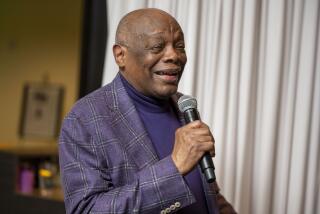Jerome Waldie, dies at 84; former state and federal lawmaker
- Share via
Jerome Waldie, the former Northern California assemblyman and congressman who became an early advocate of impeaching President Nixon during the Watergate scandal, died Friday at his home in Placerville. He was 84.
Waldie had been in poor health the last three months, said his son, Jon.
The Democrat from Contra Costa County served in the state Legislature from 1959 to 1966 and was majority leader under Speaker Jesse Unruh. Although a liberal Democrat, he was known for his bipartisanship and played a major role in ending the impasse over the 1963 budget when Unruh punished stubborn Assembly Republicans by locking them in the Capitol building for several days.
“Jerry was a statesman,” said former Republican Assemblyman William Bagley of San Rafael, who joined the Legislature in 1960. “He became the intermediary between the Republicans and Jesse Unruh, who at that time was much too forceful.”
Waldie also was known for championing the rights of the developmentally disabled and opposing a proposal to build a peripheral canal to send Northern California water to the southern half of the state, according to John Burton, the former congressman and state Senate leader from San Francisco.
One of Waldie’s last acts as a legislator was sponsoring a bill that brought dramatic changes to the Legislature by requiring it to hold full 180-day sessions every year, instead of every other year.
He left Sacramento for Washington in 1966, when he won a special election to fill a vacancy caused by the death of Rep. John F. Baldwin. In 1974 he gave up his seat to run for governor but lost in the June primary, trailing far behind several better-known Democrats, including San Francisco Mayor Joseph Alioto and then-Secretary of State Jerry Brown, who won the general election.
The Watergate investigation that was dominating the news also hampered Waldie’s campaign for governor. He had vowed to walk the length of California to meet voters but frequently interrupted his journey to return to Washington, where the Watergate hearings were underway. One of Nixon’s most outspoken critics, he was one of the first members of the House Judiciary Committee to call for impeachment, after the firing in October 1973 of Watergate special prosecutor Archibald Cox, who had angered Nixon by demanding the release of crucial White House tapes.
Three days after Cox was fired in the “Saturday night massacre,” Waldie introduced a resolution citing obstruction of justice as grounds for impeachment. Faced with the near certainty of his removal, Nixon resigned on Aug. 9, 1974.
“What [Nixon] did was just abominable,” Waldie told the Antioch Ledger Dispatch in 2001. “I felt so good at the end of that process.”
Waldie was born in Antioch on Feb. 15, 1925. After serving in the Army during World War II, he studied political science at UC Berkeley, where he earned a law degree in 1953.
After leaving Congress, he returned to his law practice in 1975. He also served on a number of commissions and boards, including the Agricultural Labor Relations Board, where he was a strong voice for farmworkers’ rights.
Waldie was known for his wry humor. As an assemblyman, he sponsored a bill for a constituent that would have legalized the killing of frogs by slingshot. The bill was unsuccessful, but it engendered a decade-long correspondence with Nestle J. Frobish of the Fair Play for Frogs Committee. Their letters were published in a 1977 book titled “Fair Play for Frogs.”
Waldie is survived by his wife, Joanne; a daughter, Jill Waldie of Placerville; two sons, Jeff of South Lake Tahoe and Jon of El Dorado; seven grandchildren; and two great-grandchildren.
More to Read
Start your day right
Sign up for Essential California for the L.A. Times biggest news, features and recommendations in your inbox six days a week.
You may occasionally receive promotional content from the Los Angeles Times.







